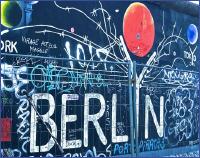The cultural capital of europe??
What makes the city of Berlin so attractive for young people from all over the world? Yes, no question, Berlin still has cheap rents comparing to other big cities, Berlin is casual and cool, Berlin looks open and tolerant. But does this image stand up to the practical test?
Can it be seen as a testing field for living together in Europe? Or is only an academic elite swaying in the tranquil illusion of their limitless tolerance, while the gentrification it causes excludes and marginalizes groups in society? Perhaps New Berlin actually only fulfills the goals of a city marketing strategy for the development of neoliberal economic areas of countless I-AGs in the creativ and media industry? Can the desire of constantly reinventing and transforming the city include the everyday interests of city residents who have to ensure their daily livelihood? Can Berlin be a model for living together, as its self-image so gladly pretends? But a big city that wants to be a cultural capital is faced with constant transformation processes.
The opening of the island of Berlin after the fall of the wall created the space for reinvention of the myth of Berlin in the 20s. Did it also want to make the following years of shame forget? Was that why it was so easy to get rid of the burden of the German (perpetrator) language in favor of the English? Was that why it was so proud that Israelis want to settle down again in this city? At least for a limited time?
Experts in moving wanted!
What is it about the image of the hip, poor but sexy hot spot of the international scene? What will happen to Berlin if gentrification has also closed the last free spaces? Is the path that other European hot spots like London and Paris have taken before Berlin inevitable? Does the spirit of resistance, which has been cultivated in Berlin for a long time, also give hope for the preservation of spaces for experiments?
Interviews with those who have been moving to Berlin during the last thirty years (and possibly also gone again) are intended to provide insights into wishes, expectations and disappointments of theier moving prozess. In the talks, the reasons for the move, the hurdles of bureaucracy, the admission to the city, the living and working situation and, last but not least, the changes in recent years are to be examined. And perhaps they dare to take a look at the future of Berlin.
Who wants to talk about his/her experiences?





